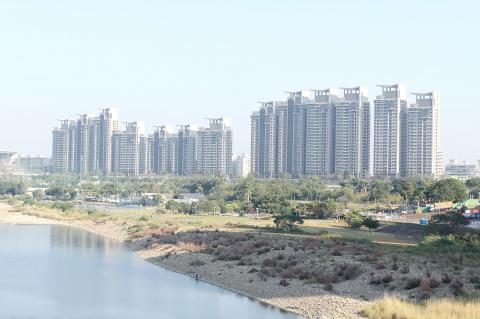An investigation should be launched into the appraisal process of all MRT joint development projects, members of Taipei City Government’s Clean Government Committee said yesterday as they announced the preliminary results of an investigation into the MeHAS City (美河市) and Syntrend Creative Park (三創園區) development projects.
Clean Government Committee member Hsu Chin-huang (徐嶔煌) said that the committee’s investigation had revealed why city-owned land had been undervalued in the appraisal process used to divide profits for the MeHAS City joint development project.
The city is in mediation with the site’s developer, Radium Life Tech Co (日勝生), seeking NT$7.6 billion (US$242 million) in compensation over alleged appraisal fraud.

Photo: Weng Yu-huang, Taipei Times
Hsu said that city land was undervalued because of illegal appraisal rules determined by the Department of Rapid Transportation Systems (DORTS), on whose land the project was constructed.
In estimating future land value, the department simply added bank interest to the appraised value of the land when project construction began, failing to take into account rapidly increasing real-estate prices, he said.
Because similar methodology was widely used by DORTS, a broader investigation into all other DORTS joint development projects should be undertaken, he said.
Committee member Wang Hsiao-yu (王小玉) called for the mediation process to be halted and project land returned to the site’s original owners, adding that she spoke only for herself because the committee’s final recommendations conclusions are still under discussion.
She also said the committee’s investigation had revealed that the main responsibility for the debacle lay with DORTS rather than former Taipei mayor Hau Lung-bin (郝龍斌).
In response to the committee’s findings, Taipei City Councilor Kao Chia-yu (高嘉瑜) of the Democratic Progressive Party (DPP) repeated demands that the city government make public all documents on the division of profits for DORTS joint development projects.
She said the MeHAS case demonstrated that the department could easily abuse its discretion in such cases, adding that making the negotiation process transparent would help the city in its bargaining by subjecting contracting firms to the pressure of public opinion.
DORTS joint development division head Li Cheng-an (李政安) said that while the department’s past actions were legal, it would seek to move the date used for appraisal of land value as close as possible to the completion of construction to ensure profit-sharing more closely reflected market changes, adding that the department had also made its appraisal process more rigorous.
He added that releasing documents relating to ongoing profit-sharing negotiations would be unwise because it could weaken the city’s position if litigation ensued.
Meanwhile, Syntrend Creative Park subcommittee convener Ma Yi-kung (馬以工) said the commission’s probe had found the project to be ridden with procedural problems.
She said the site’s zoning was problematic, at it was registered as a “parking garage” in a technology district and that its “add-on” technology complex was far larger than the “main” parking garage used for official registration.

SECURITY: As China is ‘reshaping’ Hong Kong’s population, Taiwan must raise the eligibility threshold for applications from Hong Kongers, Chiu Chui-cheng said When Hong Kong and Macau citizens apply for residency in Taiwan, it would be under a new category that includes a “national security observation period,” Mainland Affairs Council (MAC) Minister Chiu Chui-cheng (邱垂正) said yesterday. President William Lai (賴清德) on March 13 announced 17 strategies to counter China’s aggression toward Taiwan, including incorporating national security considerations into the review process for residency applications from Hong Kong and Macau citizens. The situation in Hong Kong is constantly changing, Chiu said to media yesterday on the sidelines of the Taipei Technology Run hosted by the Taipei Neihu Technology Park Development Association. With

CARROT AND STICK: While unrelenting in its military threats, China attracted nearly 40,000 Taiwanese to over 400 business events last year Nearly 40,000 Taiwanese last year joined industry events in China, such as conferences and trade fairs, supported by the Chinese government, a study showed yesterday, as Beijing ramps up a charm offensive toward Taipei alongside military pressure. China has long taken a carrot-and-stick approach to Taiwan, threatening it with the prospect of military action while reaching out to those it believes are amenable to Beijing’s point of view. Taiwanese security officials are wary of what they see as Beijing’s influence campaigns to sway public opinion after Taipei and Beijing gradually resumed travel links halted by the COVID-19 pandemic, but the scale of

A US Marine Corps regiment equipped with Naval Strike Missiles (NSM) is set to participate in the upcoming Balikatan 25 exercise in the Luzon Strait, marking the system’s first-ever deployment in the Philippines. US and Philippine officials have separately confirmed that the Navy Marine Expeditionary Ship Interdiction System (NMESIS) — the mobile launch platform for the Naval Strike Missile — would take part in the joint exercise. The missiles are being deployed to “a strategic first island chain chokepoint” in the waters between Taiwan proper and the Philippines, US-based Naval News reported. “The Luzon Strait and Bashi Channel represent a critical access

Pope Francis is be laid to rest on Saturday after lying in state for three days in St Peter’s Basilica, where the faithful are expected to flock to pay their respects to history’s first Latin American pontiff. The cardinals met yesterday in the Vatican’s synod hall to chart the next steps before a conclave begins to choose Francis’ successor, as condolences poured in from around the world. According to current norms, the conclave must begin between May 5 and 10. The cardinals set the funeral for Saturday at 10am in St Peter’s Square, to be celebrated by the dean of the College